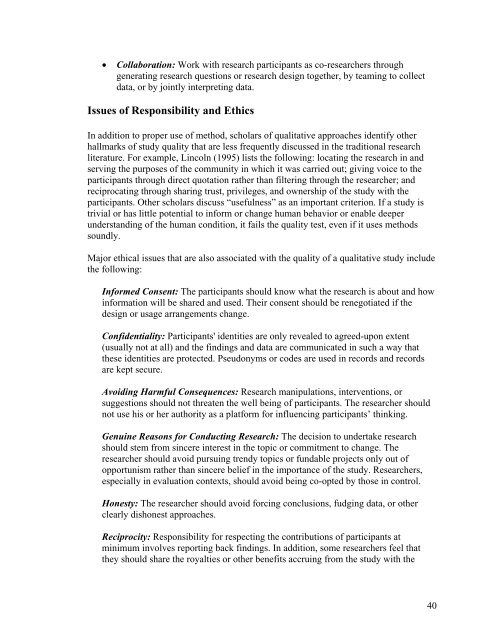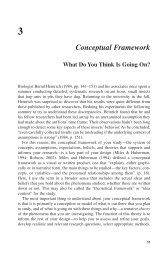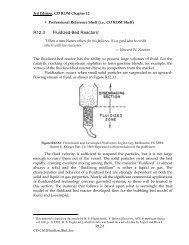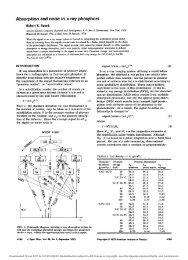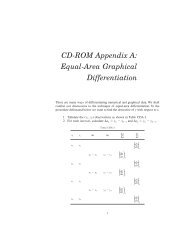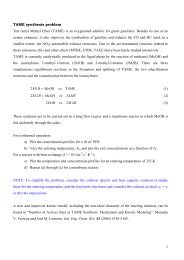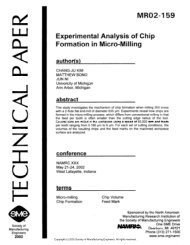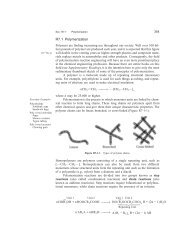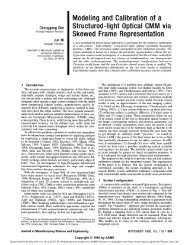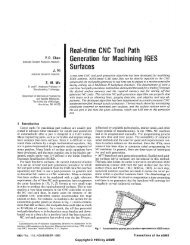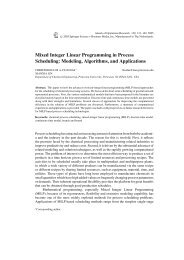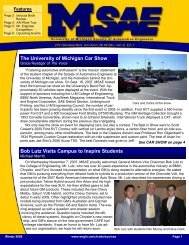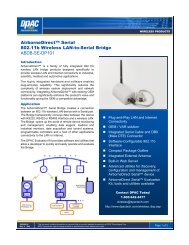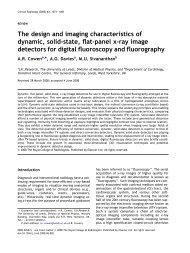Qualitative Research Basics: A Guide for Engineering Educators
Qualitative Research Basics: A Guide for Engineering Educators
Qualitative Research Basics: A Guide for Engineering Educators
You also want an ePaper? Increase the reach of your titles
YUMPU automatically turns print PDFs into web optimized ePapers that Google loves.
• Collaboration: Work with research participants as co-researchers through<br />
generating research questions or research design together, by teaming to collect<br />
data, or by jointly interpreting data.<br />
Issues of Responsibility and Ethics<br />
In addition to proper use of method, scholars of qualitative approaches identify other<br />
hallmarks of study quality that are less frequently discussed in the traditional research<br />
literature. For example, Lincoln (1995) lists the following: locating the research in and<br />
serving the purposes of the community in which it was carried out; giving voice to the<br />
participants through direct quotation rather than filtering through the researcher; and<br />
reciprocating through sharing trust, privileges, and ownership of the study with the<br />
participants. Other scholars discuss “usefulness” as an important criterion. If a study is<br />
trivial or has little potential to in<strong>for</strong>m or change human behavior or enable deeper<br />
understanding of the human condition, it fails the quality test, even if it uses methods<br />
soundly.<br />
Major ethical issues that are also associated with the quality of a qualitative study include<br />
the following:<br />
In<strong>for</strong>med Consent: The participants should know what the research is about and how<br />
in<strong>for</strong>mation will be shared and used. Their consent should be renegotiated if the<br />
design or usage arrangements change.<br />
Confidentiality: Participants' identities are only revealed to agreed-upon extent<br />
(usually not at all) and the findings and data are communicated in such a way that<br />
these identities are protected. Pseudonyms or codes are used in records and records<br />
are kept secure.<br />
Avoiding Harmful Consequences: <strong>Research</strong> manipulations, interventions, or<br />
suggestions should not threaten the well being of participants. The researcher should<br />
not use his or her authority as a plat<strong>for</strong>m <strong>for</strong> influencing participants’ thinking.<br />
Genuine Reasons <strong>for</strong> Conducting <strong>Research</strong>: The decision to undertake research<br />
should stem from sincere interest in the topic or commitment to change. The<br />
researcher should avoid pursuing trendy topics or fundable projects only out of<br />
opportunism rather than sincere belief in the importance of the study. <strong>Research</strong>ers,<br />
especially in evaluation contexts, should avoid being co-opted by those in control.<br />
Honesty: The researcher should avoid <strong>for</strong>cing conclusions, fudging data, or other<br />
clearly dishonest approaches.<br />
Reciprocity: Responsibility <strong>for</strong> respecting the contributions of participants at<br />
minimum involves reporting back findings. In addition, some researchers feel that<br />
they should share the royalties or other benefits accruing from the study with the<br />
40


